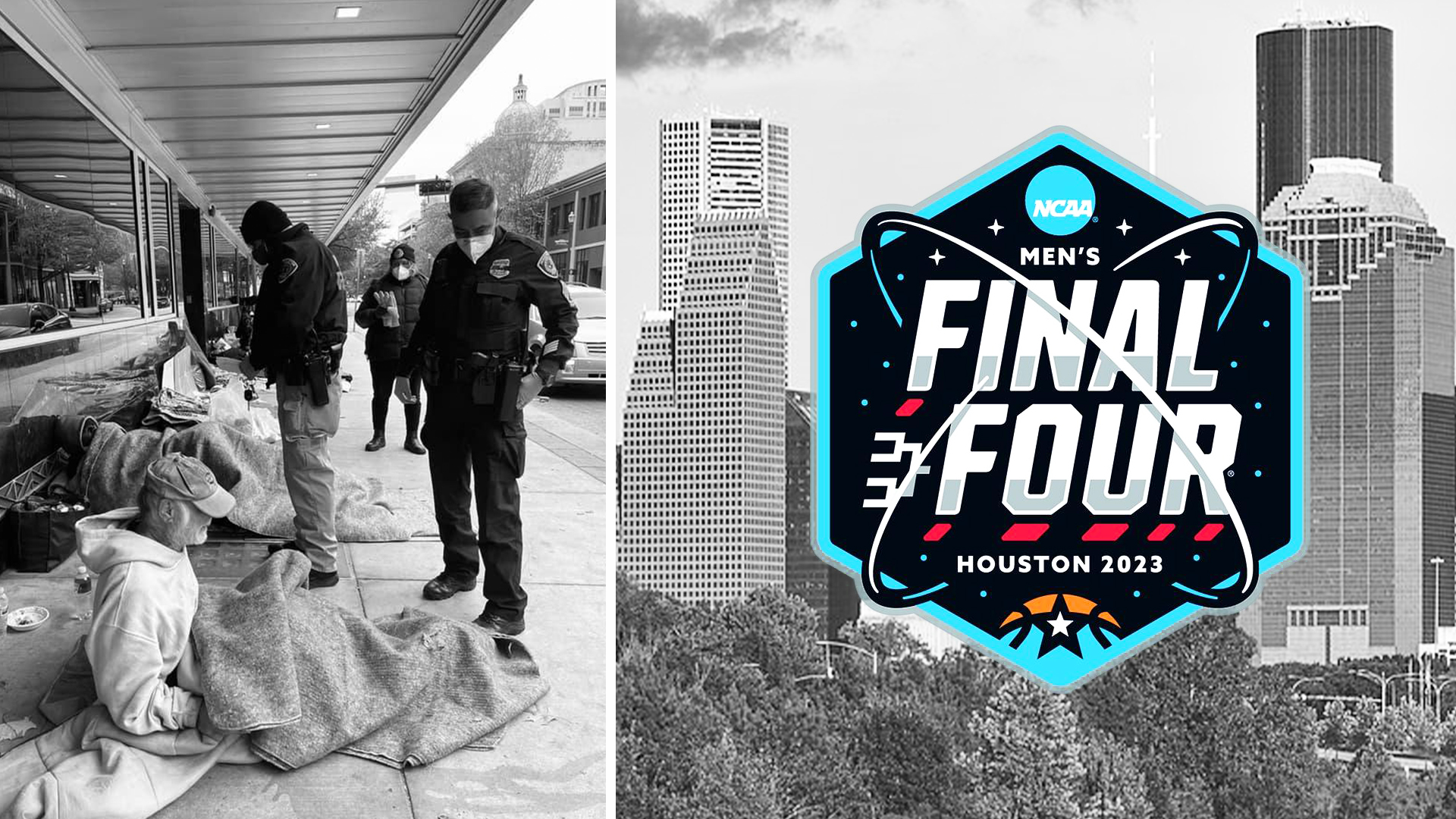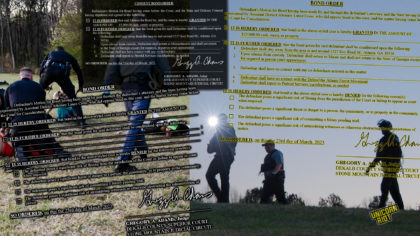Ahead of the Final Four, Houston Criminalizes Homelessness
Efforts by cities across the country to “clean up” before major sporting events such as the Super Bowl aren’t new. But when those efforts involve forcing the unhoused away from certain areas, they often employ the use of police to criminalize support services for homeless people.
In Houston, TX., where the NCAA Final Four (college basketball tournament championship games) will take place March 31 – April 3, the mayor’s office has taken it a step beyond displacing the unhoused. Mayor Sylvester Turner’s office has ordered police to target people feeding those in need.
After opening a facility to move people miles from downtown from a homeless encampment near Minute Maid Park and the Toyota Center, Mayor Turner began invoking old city ordinances to ticket Food Not Bombs Houston (FNBH) food-sharing volunteers and trying to discourage them from doing what they’ve done for decades: feeding people at the Houston Public Library every night.
Mayor Turner’s office claims there is an increase in threats and violent incidents against families visiting the library. Because of that, it is offering what it refers to as an “alternative charitable food service” located at 61 Reisner St. – the Houston Police Department’s Central Patrol Station. Due to added pressure from the mayor’s office and Houston police, some of the unhoused have agreed to move.
But the city’s effort is opposed by volunteers at the library. When asked about moving the homeless from specific areas in what appears to be an effort to hide some of the biggest issues affecting the city, the mayor’s office responded with the same statement it issued to all media outlets.
“Recently, there has been an increase in the number of threats and violent incidents directed at visitors and employees coming to the Houston Public Library downtown. Parents and families have expressed no longer feeling comfortable visiting the library or holding special events. We want the library to serve as a safe, inclusive place for all to come and visit. That’s why we are providing a dedicated, alternative charitable food service at 61 Riesner St. This location has the infrastructure and amenities needed to provide services and food to Houstonians in need. By shifting food services to an alternative location, we can maintain the integrity and historic nature of Houston’s Public Library while serving all Houstonians with the dignity they deserve.”
Mary Benton, Houston Mayor Sylvester Turner’s Director of Communications

Unicorn Riot set out to substantiate the claims made by Mayor Turner’s office and was met with silence. When asked to provide evidence or statistics regarding the alleged attacks, the mayor’s office did not respond. Nor did it say anything about the sudden urge to move the homeless from specific areas of downtown. When asked why it was targeting FNBH, they again provided no comment.
But when asking the volunteers, who are there every day and whom the mayor’s office is laser-focused on, they dispute the narrative presented by the city. Several volunteers have already been ticketed because of an order to Houston Police by the Mayor’s office. One has filed a federal lawsuit against the city citing a violation of their first amendment rights to freedom of speech and expression.
A sign posted at the public library cites the ordinance that took effect on Feb. 24, 2023. It states that if “you do not comply with these rules and regulations, beyond 7:00 p.m. on Friday, February 24, 2023, you run the risk of violating the law.” Five days later, the first citation was issued to an FNBH volunteer. Since then, a total of eight volunteers have been ticketed so far. Some advocates for the homeless now fear being arrested.
There’s strong evidence of continued escalation by the city. In a video posted on Facebook, a Houston Police officer admitted to an FNBH volunteer that they are monitoring their social media pages. This is an alarming development highlighting how police use information gleaned from the tech sector’s data channels circumventing the need for search warrants to gain access to personal information. This comes as part of the effort to move homeless people away from the highly visible Houston Public Library.
This isn’t the first time the city of Houston has done this. Prior to the Super Bowl in 2017, many homeless people were displaced by the clearing of encampments near the stadium. While the city denied claims that it was behind making the homeless disappear from the area, it’s much more than coincidental, as some would suggest as these tactics aren’t isolated to the fourth largest city in the U.S.
Many cities have made similar moves. In 2011, the city of Dallas increased pressure on the homeless by strengthening an ordinance against panhandling. Like Mayor Turner, then-Dallas mayor Tom Leppert denied coming down hard on the homeless because of the Super Bowl. Similarly, mayors from other major cities who have criminalized the homeless in specific areas to make them go away for an event have also denied doing so.
Cities across the country routinely take similar measures against their unhoused populations in the lead-up to major sporting events. It isn’t just happenstance that police become enforcers in the weeks leading up to them.
Unicorn Riot reached out to the NCAA for comment. We have received no response as of this writing.
Cover image by Niko Georgiades for Unicorn Riot featuring photo of Houston Police Department responding to unhoused people via Houston Police Department’s Facebook Page, Houston’s skyline via David Daniel Turner, and the Final Four 2023 logo via NCAA.
Follow us on X (aka Twitter), Facebook, YouTube, Vimeo, Instagram, Mastodon, Threads, BlueSky and Patreon.



